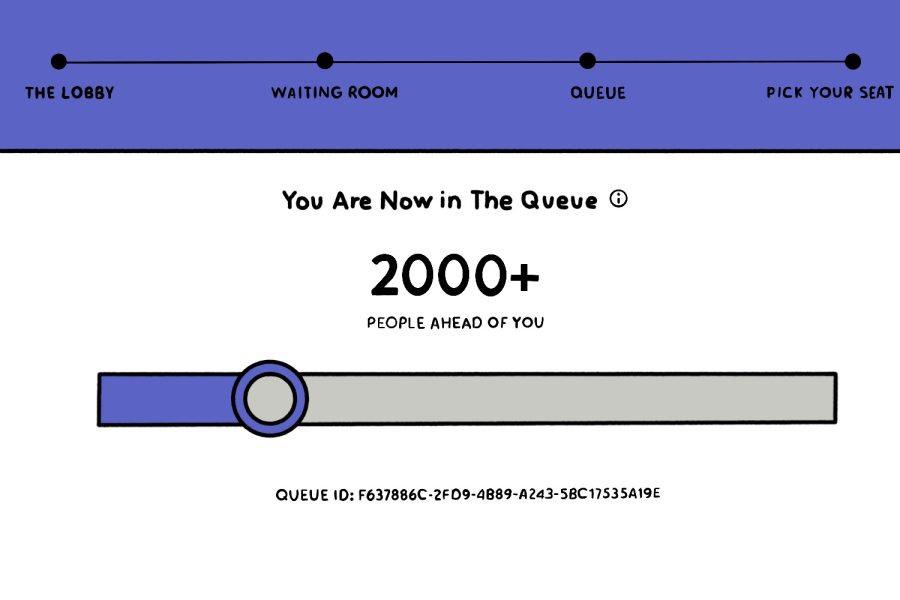Director: Christopher Nolan
Release Date: July 21, 2023
MPAA Rating: R
Starring: Cillian Murphy (J. Robert Oppenheimer), Robert Downey Jr. (Lewis Strauss), Matt Damon (General Leslie Groves), Emily Blunt (Kitty Oppenheimer), Florence Pugh (Jean Tatlock) and more
Our rating: A+
Christopher Nolan’s “Oppenheimer”, the long-anticipated biopic of the father of the atomic bomb, is an intense and perfectly acted masterpiece. The film raked in $717.8 million, making it the highest grossing World War Two movie of all time. This phenomenon may be partially explained by the film’s double feature with Barbie. Some questioned how two seemingly diametrically opposed films could work in tandem, but “Barbie” and “Oppenheimer” both have existentialist themes that were executed perfectly. However, “Oppenheimer” should ultimately sweep the Oscars because of Cillian Murphy’s electrifying performance as J. Robert Oppenheimer, arguably the most important figure of the 20th century.
The film follows Oppenheimer’s discovery of the atomic bomb and his subsequent psychological unraveling as he grapples with the monster he’s created. The opening minutes are peppered with incredible cinematography that set a dramatic and grave tone; even when the protagonist is young, he is haunted by the power of nuclear explosions.
“I think this movie acts as a warning sign for countries with nuclear weapons. It shows the true moral and social dilemma of dropping a bomb to stop a war but killing hundreds of thousands of people to do so,” senior Gabi McGrath-Moreira said.
The plot is expertly paced and constantly mounts in suspense. Scenes of Oppenheimer’s scientific career and his work to develop the bomb with his colleagues of the Manhattan Project are interspersed with moments later in time, in which he loses his security clearance due to his ties with communists and unsuccessfully fights to mitigate nuclear proliferation. This non-chronological structure can make the plot hard to follow, especially when this is coupled with dialogue that is difficult to hear.
Nevertheless, this juxtaposition strengthens the film’s urgency and poignant message. It is tragic to witness Oppenheimer’s naive idealism and his belief that the atomic bomb would prevent another world war be so brutally contradicted. “Oppie”, as he is nicknamed, ends his life thinking that he destroyed the world. Setting his emotional torment against the backdrop of the Cold War and the Red Scare provides a very unique and scary perspective on one of the most pivotal events in world history.
“The intense sounds present throughout the movie were a feast for the ears. The scene in which everyone in Los Alamos started stamping their feet while celebrating the bomb made me feel like I was watching a horror movie,” senior Steffi Sarmiento-Mena said.
But it is the film’s ingenious score that truly conveys the horrors of war. The “Trinity Test”, in which the scientists drop the bomb for the first time, is a standout moment that aptly foreshadows the catastrophic ramifications of nuclear weapons.
“During the Trinity Test scene, they held off the sound of the explosion for about a whole minute. It was amazing, because it kept watchers on their toes. Just when you thought that they chose not to put in that sound you heard the ear splitting noise, and everyone in the theater jumped in their seat,” senior Gabi Blanco said.
Furthermore, the film’s three hour runtime somehow did not feel excessively long. The only thing that did not add to the story was the sex scene with Oppenheimer and his first love interest Jean. Though the scene was not gratuitous, it was unnecessary and could have been removed in favor of expanding on Jean’s storyline. The movie has also been criticized for not showing much imagery of Japanese people, who suffered horrific deaths due to the bombings of Hiroshima and Nagasaki. In addition, it leaves out New Mexicans exposed to radiation from the atomic bomb’s development and testing. While these victims’ stories deserve to be told, this film focuses primarily on Oppenheimer’s story. Adding new plotlines and themes would have felt shoehorned in due to the lengthy runtime.
“What became the most repetitive in my opinion was the interrogation process that Oppenheimer goes through at the end of the movie. While it is important and gives a lot of insight on what happened after the bombings, it just is not interesting enough to keep people hooked the entire time,” senior Gabi Blanco said.
“Oppenheimer” is one of the best films in years due to its unflinching portrayal of the downfall of its protagonist. One leaves the film terrified of the atomic bomb’s catastrophic potential and wondering whether its use to end World War Two was justified or not. Perfectly acted and written, the movie deserves all its commercial and critical acclaim.











